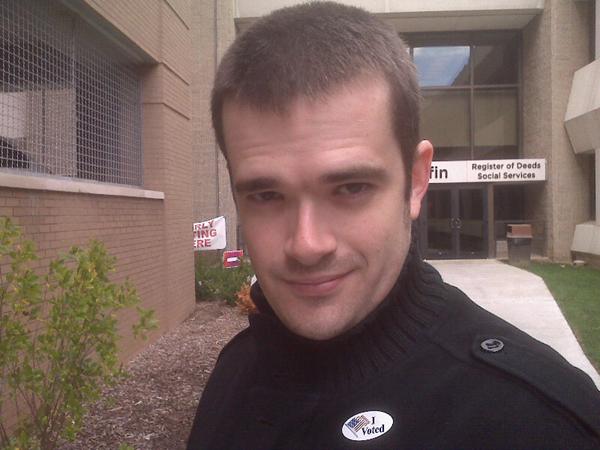I voted yesterday, Oct. 20, the first day of early voting for the general elections, at the Buncombe County Board of Elections on Woodfin Street. In the process, I found out one of the poll workers lives across the street; I shook his hand, filled out my ballot and was proud to wear my “I Voted” sticker for the rest of the day.
Voting was part of life, growing up. As soon as we were able, my mother would take my sister and I into the polling booth while she filled out the ballot. One of us usually carried the voter guide from the local paper, her choices circled in red. If I asked why she chose one candidate over another, she’d tell me. As we grew older, she explained why things did or didn’t happen, and how it related to who was chosen: class sizes that went up, buildings that weren’t built or, on a happier note, why our water quality improved.
It was an early lesson: A citizen votes. Always. Furthermore, there’s a difference in who gets chosen or who doesn’t, and what they’ll do for (or to) you and yours. Right now, Asheville has to choose which candidates will occupy three seats on City Council, and the county as a whole has to decide how it will vote on a 1/4 cent sales tax increase requested by A-B Tech.
Early voting is a boon, especially for those of us who work for a living. All too often, I remember my mother and father scrambling to get to the polling place — the cinderblock Ruritan club in South Mills — before it closed. For the public school teacher and the contractor working long hours, early voting took that last-minute fear away.
I was happy to see that I was the 126th voter at the downtown location yesterday. With early voting not even a whole day old, that hopefully points to something better than the anemic turnouts one is used to seeing in Asheville elections (primary turnout this year almost dipped below the double digits, squeaking in at 10.7 percent).
The city of Asheville has an annual budget of $132 million. Its rules control what can and can’t get built and who pays for it. Included among its many employees are the Asheville Police Department, with 241 officers legally allowed to use force and ascertain when a crime is being committed — a subject of no small amount of controversy this year. If you can’t think of some way to improve our city with that (or many, many ways the wrong people could make things far worse), you’re not trying.
Early voting provides an opportunity for people to weigh in on that, and takes away a major constraint that kept working class people from getting to the polls. This year, I hope that, for once, my election night report won’t contain the words “record low turnout…”




Mr Forbes,
Did you know that Jan Davis, the incumbent running again for City Council voted no to early voting sites?
That would certainly have made it more difficult for the workers to get out to vote!
You should know that a lot of us in different neighborhoods are very concerned about who will get elected to City Council as we know all too well how their votes can affect our neighborhoods.
We are writing a letter to the editor about why we are supporting Chris Pelly, Marc Hunt & Lael Gray & not Jan Davis or Mark Cates.